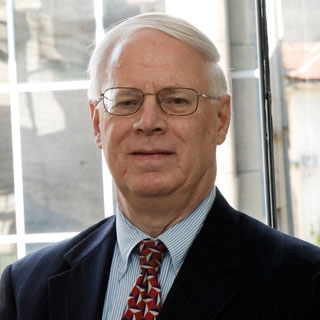Robert Strahota ’62, MBA ’64

Building Emerging Securities Markets

The perfect segue to Bob Strahota’s career trajectory came shortly after the Berlin Wall fell. It was 1991 and he had just returned, after 19 years of private law practice, to the US Securities and Exchange Commission as an attorney fellow in its Office of General Counsel. Newly independent nations across Europe were seeking assistance to develop market economies after many years as members of the Soviet Bloc. Many had asked the SEC to provide technical assistance in developing regulations for their new securities markets. Poland was one of these emerging markets. In 1992, Strahota went to Warsaw as SEC senior advisor to the Polish Securities Commission to help them develop their fledgling market, opened the previous year. For his work there, he was awarded an Officer’s Cross for meritorious service to the Republic of Poland.
“This assignment established my credibility regarding the development and regulation of emerging securities markets,” recalls Strahota, who quickly points out that the real credit for the development of the Polish market belongs with the leadership of the Polish Commission and Warsaw Stock Exchange who recognized, in the face of strong political pressure, that sound securities regulation based upon principles of full disclosure was a critical component of market development It didn’t happen overnight, but “the Warsaw Stock Exchange has become the most successful securities market in Central and Eastern Europe and one of the most active markets in the European Union, ”he says.
Following his work in Poland, Strahota moved to the SEC’s Office of International Affairs, where he managed the SEC’s technical assistance and training programs for emerging markets until his retirement in 2005. This work included running the SEC’s annual Institutes for Securities Market Development and Securities Enforcement as well as overseas assistance missions funded by the US Agency for International Development and international financial institutions. The SEC’s programs, which are ongoing, have provided US training for several thousand regulatory and stock exchange personnel from over 100 countries. The work has taken Strahota to more than 40 developing countries.
Strahota’s first experience at the SEC began much earlier, as a financial analyst during the summer of 1963 when he was still a student at Johnson. He joined the SEC’s Division of Corporation Finance after graduation in 1964. “These were exciting times for college graduates entering government service because of the promise and opportunities of the Kennedy administration’s New Frontier programs,” he says. Early on, Strahota observed that lawyers, particularly those knowledgeable in finance and accounting, were the SEC’s dominant management and policy-making group. For example, a number of SEC staffers, mostly lawyers, were working to complete a special study of securities markets that was to become an “historic milestone in securities regulation,” explains Strahota. “I wanted to become part of this regulatory process.” So he spent his evenings studying and earned a law degree from the Catholic University of America’s School of Law. However, after seven years at the SEC, the attraction of a rewarding position at a major law firm and the financial burdens of raising a family steered him toward private practice; in 1972 he joined the law firm of Kirkland & Ellis, where he specialized in securities, corporate, and partnership law. Nineteen years later, eager to become involved in recommending regulatory policies for emerging markets, Strahota went back to SEC.
“One of the challenges I frequently faced during the early years was to identify US securities market regulations that would make practical sense for these countries,” says Strahota. One could not simply clone US regulations designed for more complex and diversified US markets. This is where his participation in the work of the International Organization of Securities Commissions (IOSCO) helped to solve this problem. Strahota participated in a working group of IOSCO members that developed the “IOSCO Objectives and Principles of Securities Regulation,” first published in 1998, and followed by a methodology designed to measure a country’s progress toward implementation of the objectives and principles. Strahota points out that the adoption of the IOSCO principles by IOSCO members and their subsequent endorsement as international best practice standards by the Financial Stability Board has been a game changer. “Rather than simply telling the emerging countries how we do things in the United States, we were able to say, ‘Here are international best practice standards that you should aspire to.’ Not only did the adoption of these principles tend to minimize conflicting advice; it also provided securities professionals in developing countries with documentation that they could use to show their legislatures what should be included in a country’s securities legislation.”
Assessing a country’s ability and commitment to successfully develop a securities market is another challenge Strahota grappled with. “Investors strongly prefer investing in markets where the only significant risks they are undertaking are investment-related risks. Most investors generally will not invest in markets that can be manipulated, where information about companies traded is not reliable, or where corporate management does not have incentives to act in the best interests of shareholders,” Strahota explains. Countries with high levels of corruption won’t have much success in establishing securities markets in which investors have confidence. “One has to know whether you have a buy-in from the government that the securities regulator will be independent of political influence and industry capture. It must be staffed with professionals who are capable of acting objectively, transparently, fairly and expediently to address problems that are critical to market development”.
Retirement has not stopped Strahota from continuing his emerging markets work. He has served as a consultant on securities regulation and corporate governance matters for Iraq, Kuwait, Serbia, Ukraine and Vietnam. “Unfortunately, Ukraine and Iraq are now subsumed by events that render any current discussion of these topics of secondary importance,” he says.
Teaching is also on his agenda; his topic of choice is investor protection issues affecting investments in emerging markets. While many regulatory safeguards already apply, investors are not as aware of the risks and opportunities as they could be, says Strahota. “How many individual investors are going to take the time to read 200+ pages of an Alibaba prospectus and be able to figure out the most important issues?” he asks. Point well taken.
Pallavi Rao, a business journalist from India, writes for Johnson as a volunteer staff member of Johnson’s Marketing and Communications team while her husband pursues his MBA here.
